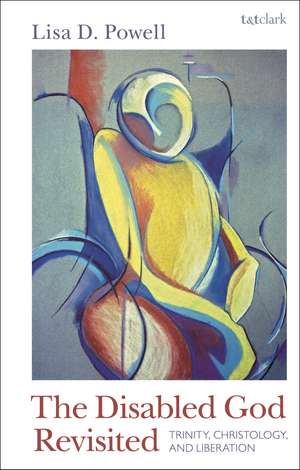The Disabled God Revisited: Trinity, Christology, and Liberation
Autor Associate Professor Lisa D. Powellen Limba Engleză Hardback – 17 mai 2023
| Toate formatele și edițiile | Preț | Express |
|---|---|---|
| Paperback (1) | 114.04 lei 3-5 săpt. | +21.49 lei 7-11 zile |
| Bloomsbury Publishing – 17 mai 2023 | 114.04 lei 3-5 săpt. | +21.49 lei 7-11 zile |
| Hardback (1) | 352.20 lei 6-8 săpt. | |
| Bloomsbury Publishing – 17 mai 2023 | 352.20 lei 6-8 săpt. |
Preț: 352.20 lei
Preț vechi: 413.07 lei
-15% Nou
Puncte Express: 528
Preț estimativ în valută:
67.40€ • 69.63$ • 56.10£
67.40€ • 69.63$ • 56.10£
Carte tipărită la comandă
Livrare economică 25 martie-08 aprilie
Preluare comenzi: 021 569.72.76
Specificații
ISBN-13: 9780567694348
ISBN-10: 0567694348
Pagini: 168
Dimensiuni: 138 x 216 x 20 mm
Greutate: 0.34 kg
Editura: Bloomsbury Publishing
Colecția T&T Clark
Locul publicării:London, United Kingdom
ISBN-10: 0567694348
Pagini: 168
Dimensiuni: 138 x 216 x 20 mm
Greutate: 0.34 kg
Editura: Bloomsbury Publishing
Colecția T&T Clark
Locul publicării:London, United Kingdom
Caracteristici
Makes a constructive contribution to liberation theology in the doctrines of God, Christology and Eschatology
Notă biografică
Lisa D. Powell is Professor of Theology and Women and Gender Studies at St. Ambrose University, USA.
Cuprins
DedicationAcknowledgements IntroductionChapter 1: Nancy Eiesland and the Disabled GodChapter 2: Covenant Ontology and The Impaired Body of the Son Chapter 3: The Vulnerability and Need of GodChapter 4: The Receptivity of GodChapter 5: Disability and ResurrectionBibliographyIndex
Recenzii
Nancy Eiesland's Disabled God has shaped several generations of disability theologians, despite leaving some important theological questions unasked. Gathering together various criticisms in an extremely helpful way, Lisa D. Powell constructively and sympathetically extends Eisland's liberation theology, and shows why the doctrine of God remains generative for a liberative theology today.
Do not let yourself be fooled by the modest title claim! Powell's magnificent book is much more than a mere "revisiting" of Eiesland's landmark Disabled God. Masterfully combining crip theory, queer critique, and Barth's doctrine of election, Powell offers nothing short of a theological ontology of God as disabled, while at the same time pulling the rug out of disability as a human identity category. Finding the triune God constituted in the eternal election of the (impaired body of the) Son, she reclaims receptivity for a kenotic Christology from its feminist critics, develops the ensuing covenantal solidarity with creation, and develops an eschatological vision of deepening mutual interdependence rather than the retention of abled/disabled individuality. The result is a doctrinally sound, critically sourced, and constructively liberationist Christology that will have repercussions across a variety of fields in the years to come.
If Barth's Romans commentary was said to have dropped like a bomb on the playground of theologians, then Powell's The Disabled God Revisited picks up the pieces left by Nancy Eiesland's The Disability God deploying the Barthian shards. Barth studies gets reconfigured and extended, disability theology is fortified, and our understanding of God and ourselves is transformed in the process.
The Disabled God Revisited is a creative and timely intervention into debates about the Trinity, Christology, theological anthropology, and liberation. Skillfully gathering insights from cutting-edge studies of Karl Barth, theologies of disability, and feminist and queer thinkers, while also advancing a powerful constructive perspective of her own, Powell's book will repay close study and inspire valuable conversations.
Powell has provided readers with a rich exploration in The Disabled God Revisited. Of course, in re-envisioning God, our sense of self is also reframed, insofar as disability is seen as received in the broken body of Christ in the Eucharist. This can be profoundly liberating for people with disabilities.
Do not let yourself be fooled by the modest title claim! Powell's magnificent book is much more than a mere "revisiting" of Eiesland's landmark Disabled God. Masterfully combining crip theory, queer critique, and Barth's doctrine of election, Powell offers nothing short of a theological ontology of God as disabled, while at the same time pulling the rug out of disability as a human identity category. Finding the triune God constituted in the eternal election of the (impaired body of the) Son, she reclaims receptivity for a kenotic Christology from its feminist critics, develops the ensuing covenantal solidarity with creation, and develops an eschatological vision of deepening mutual interdependence rather than the retention of abled/disabled individuality. The result is a doctrinally sound, critically sourced, and constructively liberationist Christology that will have repercussions across a variety of fields in the years to come.
If Barth's Romans commentary was said to have dropped like a bomb on the playground of theologians, then Powell's The Disabled God Revisited picks up the pieces left by Nancy Eiesland's The Disability God deploying the Barthian shards. Barth studies gets reconfigured and extended, disability theology is fortified, and our understanding of God and ourselves is transformed in the process.
The Disabled God Revisited is a creative and timely intervention into debates about the Trinity, Christology, theological anthropology, and liberation. Skillfully gathering insights from cutting-edge studies of Karl Barth, theologies of disability, and feminist and queer thinkers, while also advancing a powerful constructive perspective of her own, Powell's book will repay close study and inspire valuable conversations.
Powell has provided readers with a rich exploration in The Disabled God Revisited. Of course, in re-envisioning God, our sense of self is also reframed, insofar as disability is seen as received in the broken body of Christ in the Eucharist. This can be profoundly liberating for people with disabilities.
